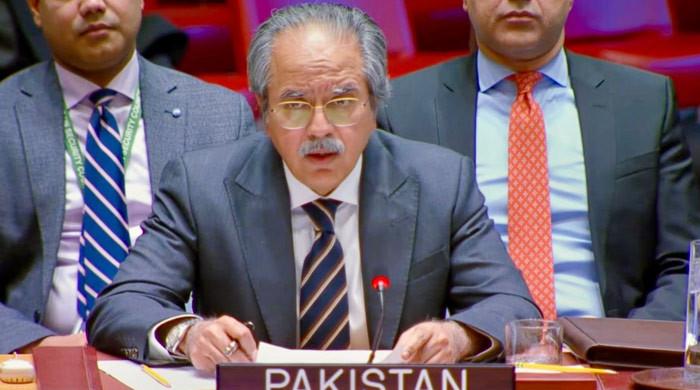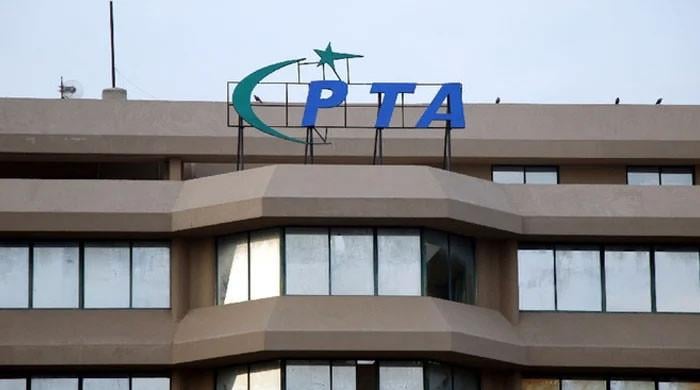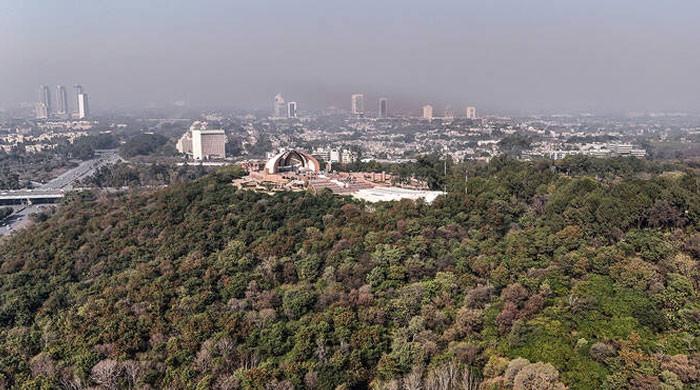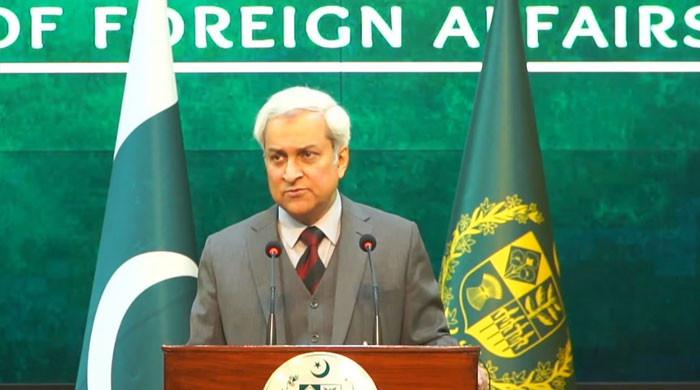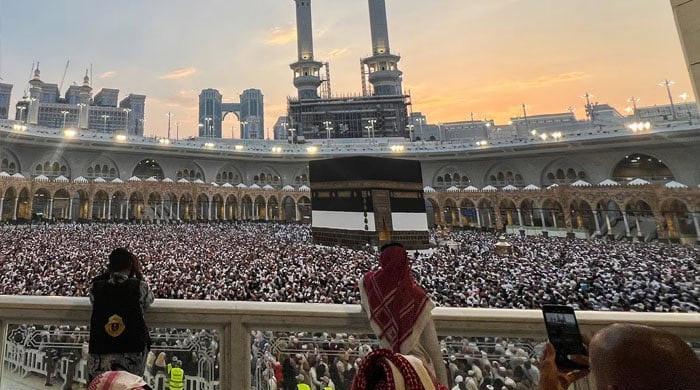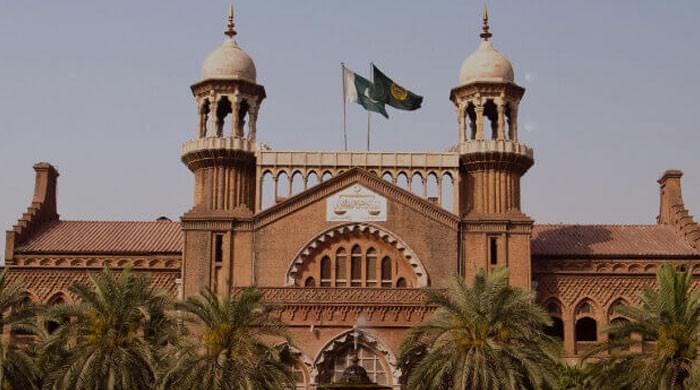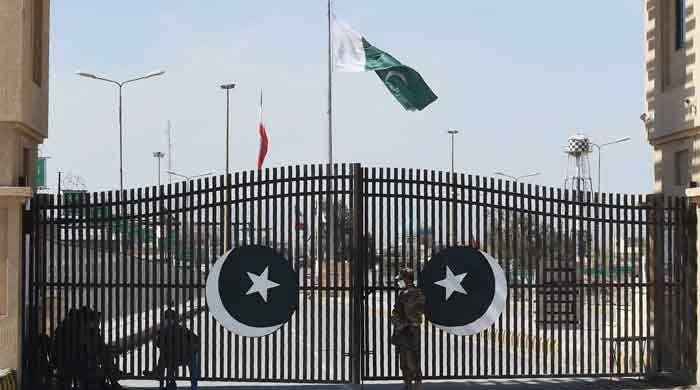NAB used by kleptocrats to change loyalties and save themselves: Shahid Khaqan Abbasi
"It is political engineering, it is manipulating politics, it is punishing people without convicting them," says former premier about NAB
November 21, 2021
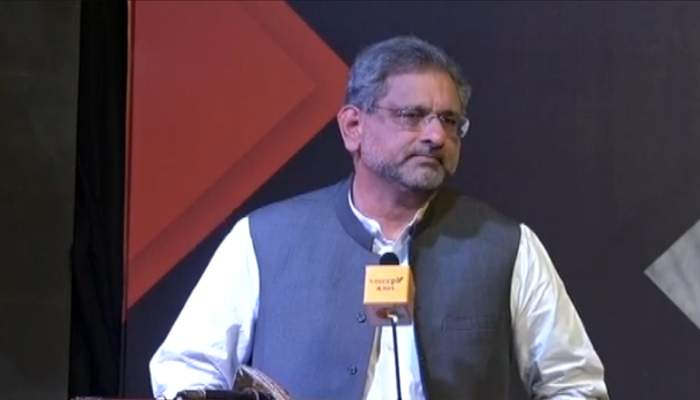
- Shahid Khaqan Abbasi says NAB a "tool" used by "kleptocrats who change loyalties and save themselves".
- Speaks of accountability not through special laws, but simple tax laws.
- Regrets proposed changes to NAB laws being viewed as demanding an "NRO".
- Highlights human aspect, 'big cost' paid by those under investigation.
LAHORE: Former prime minister Shahid Khaqan Abbasi on Sunday denounced the National Accountability Bureau (NAB), terming it a "tool" with which "kleptocrats change loyalties and save themselves".
"Where are all the kleptocrats? Where are the ones who made money? They sit in every government that is formed in Pakistan," he said, while addressing the Asma Jahangir Conference.
"I am all for accountability — if you want accountability. NAB is not accountability. NAB is whatever it is — it is political engineering, it is manipulating politics, it is punishing people without convicting them," he remarked.
The PML-N stalwart went on to say NAB is about "victimisation" — not that of an individual, or a group of individuals, or even a political party. "The entity paying the price today are the people of Pakistan," he elaborated.
Earlier, at the start of his address, Abbasi said that the question of accountability or victimisation is something that is discussed a lot "but the reality of the situation remains unclear".
"It remains unclear because we deliberately cloud the facts. The laws are misused," he said, adding: "A few who stand up suffer, and the whole country suffers."
Abbasi said that although he does not want his speech to be some sort of a "personal narrative", he stood in accountability courts for 12 years and spent three years in jail. He said he does not regret what he said or did, "but two questions remain: what is the purpose of accountability and what has accountability delivered to the country".
Answering the two, he said the purpose is "very clear". He said since Pakistan came into being, there was always some form of accountability law, changing only in name over the years.
"There's been one consistency in all these laws — they don't apply to the people who created these laws."
He said the people in charge of applying these laws are also insulated from them. "That is the reality of NAB today."
'NAB applies only to politicians'
"Who does NAB apply to? The politicians, who are declared corrupt in the media, who are tried in the media," he said.
Abbasi said that in the 21 years NAB has been operating, only "one politician of prominence has been convicted in NAB courts", referring to former prime minister Nawaz Sharif.
He asked the NAB chairman to come forth and reveal how much money he had recovered from politicians. He also asked the legal fraternity whether the two cases Nawaz has been convicted in can be quoted as legal precedents anywhere in the world.
'NAB law defies every principle of justice'
The former prime minister described the NAB law as one that "defies every basic principle of justice". He said the law says "I declare you guilty, now prove your innocence".
He went on to say that "anything can be written in a charge sheet". Citing his own example, he said he has a case against him with a 34-page long chargesheet, whereas the NAB reference was 19 pages long. "How does that happen? What are we doing? Where are we going?"
Abbasi said the law requires one to maintain records for seven years, "but you are trying me for 35 years".
He said the accuser should then also furnish their 35-year record. "I definitely cannot," he added.
Accountability through tax laws
The former prime minister said that accountability of politicians is very simple — the whole world does it and it does not require special laws, it is done through tax laws.
"The people who apply taxes on the people of Pakistan should answer for their own taxes and they should answer for their own lifestyles," he said.
He said if the country's leaders are earning then they should be paying taxes. "If members of parliament walk out to a Rs30 million or a Rs60 million vehicle, and go to a Rs50 million home and their monthly electric bills are Rs200,000 and they pay no taxes, what does that tell you?"
"That's a corrupt politician. Why don't we go after them?" he asked.
Abbasi said that the process should start with the president, then the prime minister, then the leader of the opposition, and so on.
He said making leaders answerable for their income through tax laws is the way to hold them accountable, adding that anyone who does not pay taxes is "committing a crime against the country".
The PML-N leader said that most people think taxes are "optional".
He spoke of an amendment he introduced for a law on the appointment of judges that mandated that a 10-year record of taxes be furnished.
Abbasi also remarked how whatever he had earned over the years, despite also having remained a prime minister, was meagre compared to what he had to pay defense lawyers. "I have spent 34 years in politics. Whatever the government of Pakistan has given me, as salary or whatever, I think I paid at least 10 times to lawyers in the country to defend me in NAB cases. Is that fair?" he asked.
NAB 'a big part' of other countries racing ahead of Pakistan
The PML-N leader, citing some figures he had pulled to demonstrate the negative impact NAB has made over the years, said that when it was established in 2000, Pakistan had a per capita income of $576, which has since risen to $1,190. "Bangladesh was at $358 and now they are at $2,097 while India has risen to $1,900 from $443."
"So who lost and who won? [...] and a big part of this is NAB."
Amendments to NAB law with consensus
He questioned how NAB can even apply to someone "who has never had any control over any public money".
Abbasi said that changes to the NAB law were made whereby "amendments can only be made through consensus".
"There are many laws, including electoral laws, which should be made through consensus. We don't seem to learn that. NAB is one of them," he said.
He regretted how a package of amendments made and given to the government was waved about four hours later in the National Assembly with the treasury benches chalking it up to the Opposition asking for "an NRO (concession under the National Reconciliation Ordinance)".
The human aspect
Abbasi said the human aspect of those who are being investigated by NAB must also be examined. "Does anyone care about what happens to people who are accused by NAB? Does anybody care about their families?"
He asked if anyone even knows that such people "can't operate their accounts, can't operate their businesses, can't get bank loans".
"There is a big human cost that is paid here," he said.
'NAB tool to convert people into turncoats'
The PML-N leader said that a public figure is one that goes through accountability "every five years at the ballot box".
"You want to accuse me? Install cameras in the investigation rooms and the court rooms. Show the people of Pakistan. That's my constituency. Show them if I have been corrupt. Accuse me in front of them. Not in closed courts, where the prosecutor doesn't make sense, where the laws don't make sense," he said.
Abbasi said that when one goes to the NAB court, they know they "will get convicted", no matter what the case is.
The former premier said that "we still stand defiant because we believe in what we do".
"We believe that without political leadership, this country will not move forward. Turncoats, hypocrites, people who sell their loyalties don't make nations.
"And NAB is a tool to convert people into turncoats and to sell their souls. That is the reality of NAB," he concluded by saying.
PTI senator says the changes NAB needed were not brought
Meanwhile, PTI Senator Ali Zafar said that the kind of amendments that were needed in NAB "were not brought".
Hailing the work done by the anti-corruption watchdog, the senator said that "even the powerful are being held to account" and that "everyone is fearful of NAB".
He said that people should display more confidence in the bureau.




